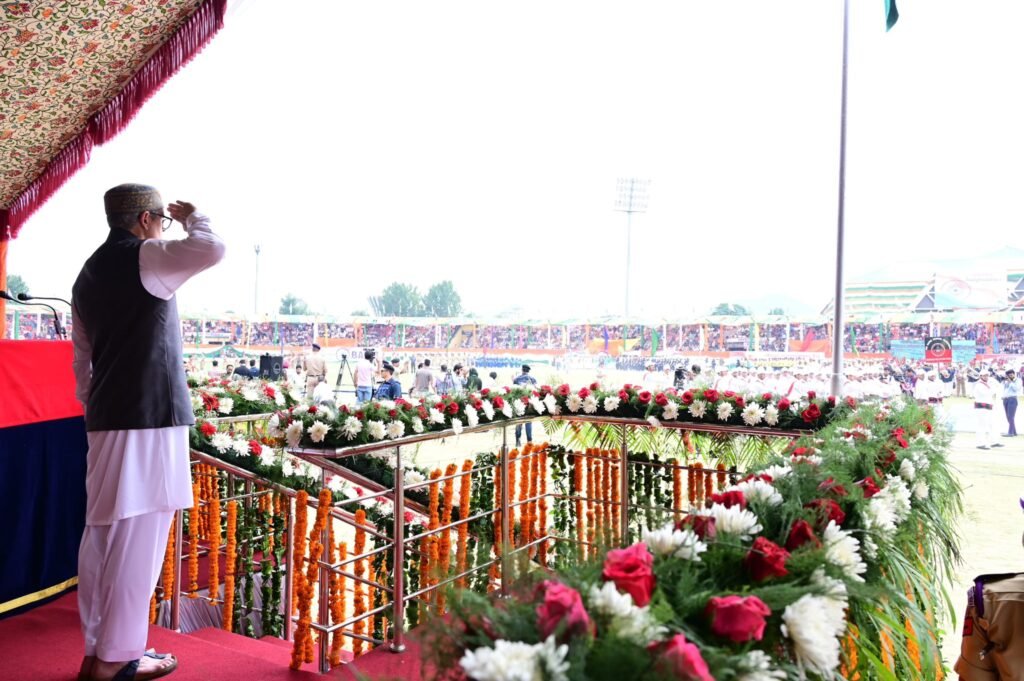
Jammu and Kashmir Chief Minister Omar Abdullah, in his first Independence Day address after being sworn in last year, delivered one of his most sharply critical speeches against the Centre, expressing fading hope about the restoration of statehood and raising fundamental questions over the “dual governance” framework currently in place in J&K.
“Losing Hope on Statehood”
Omar Abdullah admitted that expectations were high across the region that the Centre would announce a significant step—possibly the restoration of statehood—on this Independence Day. “My well-wishers told me something big for J&K would be announced, but nothing has come. The ray of hope is fading, but we won’t give up,” he said, underlining the ongoing struggle for the rights and unique identity that Jammu and Kashmir once enjoyed.
He recalled that it had been over six years since the abrogation of Jammu and Kashmir’s special status and downgrade from state to Union Territory, and today, those promises of bringing the region “on par” with the rest of India feel more elusive than ever.

Critique of the “Dual System” – “Built for Failure”
Abdullah was categorical in branding the current dual power structure—a system with both an elected Chief Minister and a Centre-appointed Lieutenant Governor—as “built for failure.” He stated, “Having two power centres anywhere is a recipe for disaster. No organisation or team functions effectively with divided leadership. It’s never going to work”. Drawing comparisons with Delhi, where a similar governance model exists, Omar stressed that even Delhi’s challenges pale in comparison to those faced by J&K, given its size, complexity, and strategic importance.
He lamented that no new governance or development benefits had come to J&K simply by virtue of this Union Territory status, refuting all claims that the change in structure was ushering in a new era of progress.
Signature Campaign for Statehood Restoration
In response to what he called “stagnation” on the statehood issue, Omar Abdullah announced the launch of an eight-week, door-to-door signature campaign across all Legislative Assembly constituencies in Jammu and Kashmir. The aim: collect signatures and thumb impressions from as many citizens as possible in support of statehood, which would then be handed over to the Centre and relevant authorities. “We will reach every household. The time has come to move beyond just writing letters or petitions”.
Appeals and Analogies
Abdullah called on the central government to keep its repeated promises—pointing to commitments made by both Prime Minister Modi and Home Minister Amit Shah. He emphasized that true democracy is driven from the grassroots, not dictated by a few at the centre—a sentiment reinforced by his invocation of Mahatma Gandhi’s vision of democracy.
He added that, despite current frustrations, his government would not stop pressing for the restoration of statehood, which he described as “the first step to prosperity and progress here”.

The Big Picture: A Region at a Crossroads
Omar Abdullah’s speech marks a pivotal moment as the first elected Chief Minister in the post-Article 370 era to unfurl the tricolour and address the people on Independence Day. His words channeled disappointment, urgency, and a call for unified, accountable governance—along with a promise that the fight for Jammu and Kashmir’s future is far from over.
Key Points:
- Omar termed J&K’s dual governance “built for failure” and a “recipe for disaster.”
- Expressed “fading” hopes for statehood but vowed continued struggle.
- Announced an 8-week region-wide signature campaign for statehood restoration.
- Challenged Centre to honor its promises; stressed need for unified, democratic leadership.
- Marked the occasion as the first I-Day address by an elected CM since J&K lost its state status.







